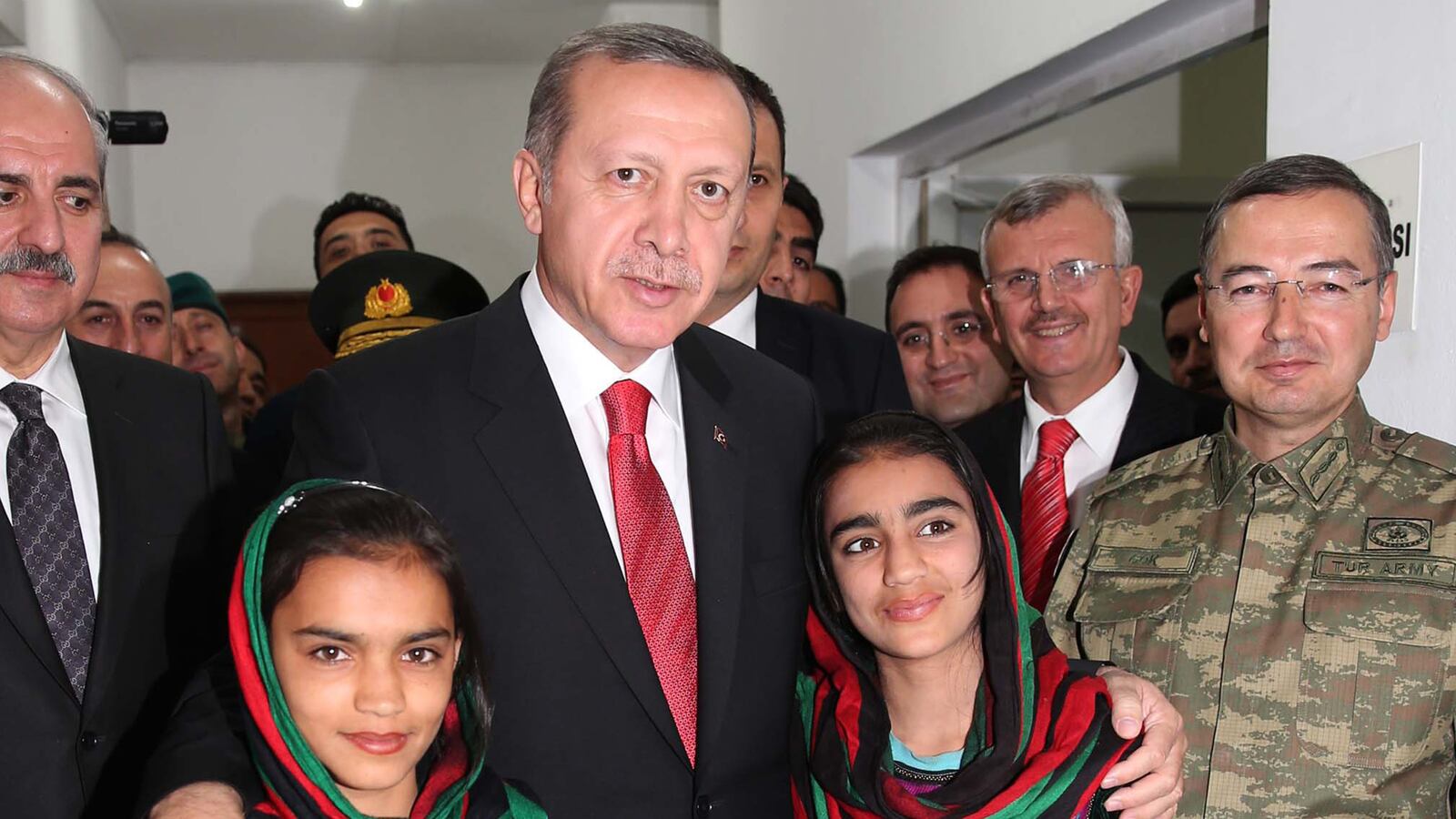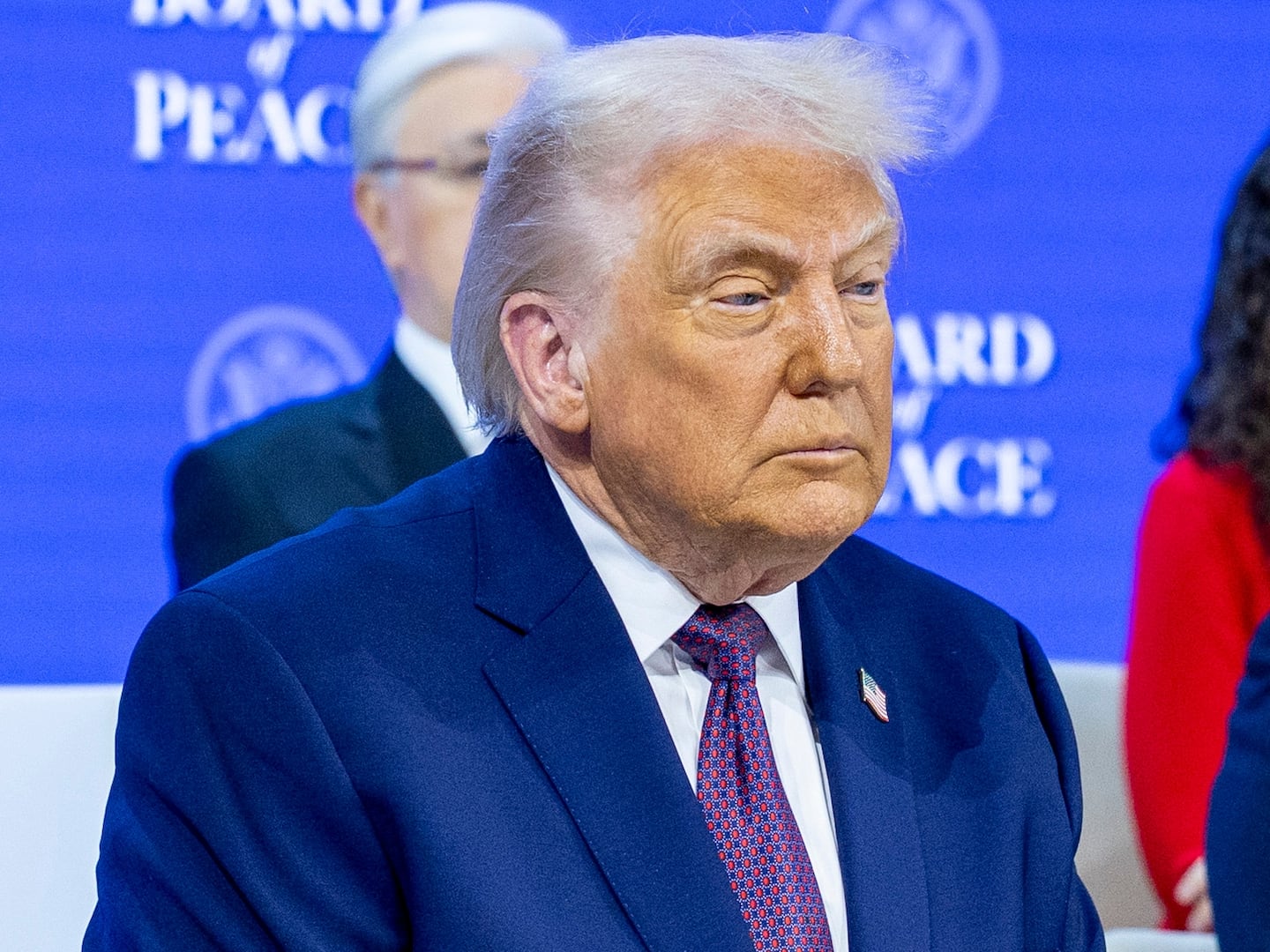ISTANBUL — In Istanbul, in the middle of a city block dubbed “Children’s Street,” a community center provides services for mothers and children. The street is closed to traffic and kids run unfettered across inviting hopscotch squares and bicycle lanes. Inside the center’s canteen, mothers sip chai, having let their children loose in the library, theater, or on playgrounds monitored by closed circuit television.
When Mayor Mehmet Teyfik Goksu of Esenler District opened the street and center this fall, fellow members of the Justice and Development Party (AKP) lauded it as a family-friendly initiative worth replicating.
But the center’s name reveals the AKP’s blend of politics and Islam: It’s named for Esme Beltagy, the 17-year-old daughter of Mohamed Beltagy, a leader of the Muslim Brotherhood in Egypt. She was shot and killed by a sniper in Rabia Square in Cairo last August while protesting the military coup that ousted President Morsi of the Brotherhood.
Conservative Muslim women in Turkey hailed Esme as a martyr and a symbol of female strength and resistance. Upon her death, women from Esenler District took to the streets, waving yellow flags and headbands stamped R4BIA, the acronym for Rabia Square. In the wake of the coup, Muslim Brotherhood leaders were targeted for arrest. Sympathies ran high among the AKP, a political party with a Sunni Muslim base that is called by some the Muslim Brotherhood of Turkey.
In some ways, the Esme Beltagy Center is ground zero for the conflicting social forces buffeting Turkey. Just days before the Minister of Social Welfare cut the ribbon on the center, women’s rights activists in Istanbul marched against Bülent Arinc, the Deputy Prime Minister and co-founder of the AKP who scolded women for laughing in public. The naming of the center signals the AKP’s Sunni Islamic pan-state identity, despite Turkey’s historic secularism and long push for European Union membership.
Over more than a decade in power, Turkish President Recep Tayyip Erdogan built sympathy among conservative Muslim voters through his successful campaign to lift the restriction on headscarves in government offices and schools. Some conservative Muslims said the ban, in place since Mustafa Kemal Ataturk founded the secular Turkish democracy, was the most visible mark of discrimination against pious women.
Yet even as some Muslim women hail their freedom to wear the veil, others point to Erdogan’s flagrant dismissal of women’s equal rights.
In a press conference on Monday as reported by Hurriyet Daily News, Erdogan stated that because women and men have different and unequal natures they do not have “equal positions.”
“You cannot put women and men on an equal footing,” Erdogan said, according to the Associated Press. “It is against nature. They were created differently. Their nature is different. Their constitution is different.”
In attacking the concept of equality, he pitted feminists against family values, saying that feminists cannot understand motherhood. Erdogan simultaneously extolled women in the only way that he knows how, as mothers: “Our religion [Islam] has defined a position for women [in society]: Motherhood.”
For over five years, Erdogan has been encouraging women to make more of their roles as mothers and have at least three, preferably five, children. Not only does this fit with his version of a woman’s role in Islam, he believes a high fertility rate is crucial for economic development. Considering them an impediment to birthing more than two children, Erdogan called caesarian section surgeries part of a secret plot to stall the country’s growth. He has since put in place penalties for hospitals and surgeons that perform elective cesareans.
Erdogan and AKP officials also use religious rationale against abortion. In 1983, a military government made abortion legal up to 10 weeks of pregnancy. Yet, in 2012, Erdogan tried to pass legislation to make abortions illegal after only four weeks, when many women are still unaware of being pregnant. A government official from the Religious Affairs Directorate defended the move with the argument that abortion is murder and against Islam. In response, women took to the streets, chanting, “I am a woman, not a mother.”
Although Erdogan’s effort to block abortion was stymied in 2012, if the AKP gains the two-thirds majority of the parliament in grand national assembly elections in 2015, Erdogan’s AKP party will control all three branches of government and plans to rewrite the constitution.
For mothers that conform to Erdogan’s mold, efforts like the Esme Belgaty Center put motherhood on a pedestal. Ozge, a mascaraed 22 year-old wearing the traditional long, flowing abaya and Chuck Taylors told me, “The center is a gift for us.” To her, being a mother is more important than working. Coming to the center gives her a measure of relief from long days filled with childcare and housework. There, she and other mothers can take ministry-sponsored courses, including on cooking and avoiding marital conflict.
Erdogan wants Turkey to be among the world’s top ten economies by 2023, but this is unlikely if women are confined to childbearing. Among the largest economies in the world, on average, almost half of women participate in the labor force. In Turkey, 29 percent of women work, the lowest rate in Europe and half the U.S. rate. In a ranking of gender-based economic disparity, Turkey is 126th out of 136 countries.
The rate of violence against women in Turkey, including honor killings, is on the rise and activists say the state not only fails to address threats against women, but also promotes a climate of impunity. According to NDTV, Erdogan told female university students that when approached with a marriage proposal, they should accept and not be picky. After Arinc’s condemnation of women’s laughter, a human rights group filed a lawsuit on the basis that his rhetoric could promote violence against women.
Erdogan’s efforts to deepen Turkey’s Sunni Islamic identity have at times undercut the country’s relations with Europe. Turkey has been a candidate to the European Union since 1999 and a staunch NATO partner since 1952. Despite widely held concerns in Europe about political Islam, Erdogan publically offers support to the Muslim Brotherhood, and is considering asylum requests by the organization’s leadership. Although Turkey is a member of the Council of Europe, Erdogan ignores rulings by the European Court of Human Rights, including the recent finding that Turkey’s compulsory religion courses, which emphasize Sunni Islam, violate students’ human rights.
“Paradise lies at the feet of mothers,” Erdogan said on Monday, quoting the Prophet Muhammad. In Turkey, some mothers find their paradise at the Esme Beltagy Center in Esenler, while others see paradise receding.






